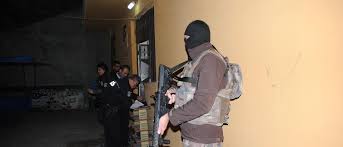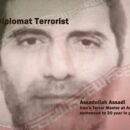How an Iranian spy penetrated Ahwazi-Arab circles to honey trap Habib Chaab

TRT WORLD | Maedeh Sharifi | 12/18/2020
A member of Iran’s minority Ahwazi-Arab community, Chaab quietly left for Turkey without informing his party about the real purpose of his visit. We speak to sources who knew the alleged Iranian spy.
Iran was found to be behind the smuggling of a prominent Ahwazi-Arab opposition figure, Habib Chaab, in a cross-border kidnap plan that was executed in early October. Habib Chaab, former President of the Arab Struggle Movement for the Liberation of Al-Ahwaz (ASMLA), flew to Turkey on October 9 to meet with ‘Sabreen’, a female spy acting on behalf of the Iranian intelligence service.
The woman lured Chaab into a van where he was drugged, knocked unconscious and smuggled across the border into Iran, according to the Turkish government. Chaab travelled to Turkey without informing any members of his party. Head of the foreign committee of ASMLA, Dr Khalaf Kaabi, told TRT World, “We heard just like any other person that he was lured to Turkey and handed over to Iranian authorities.”
“It is against the rules and regulations of the executive committee of ASMLA. You cannot leave without informing – for us to permit, allow or refuse the travel. We know that Iranian agents are after us all the time”. Habib Chaab’s abduction comes years after Ahmed Mola Neissi, the founder of ASMLA, was shot dead outside his home in the Netherlands in 2017. Iran denied allegations that it was involved in the murder plot. However, Dutch Ministers, Stef Blok of Foreign Affairs, and Kasja Ollongren of Home Affairs, suggested through a letter to parliament that the killing was likely to be Iran-orchestrated.
The Spy – ‘Sabreen’
Sources with previous ties to Sabreen have requested anonymity and given TRT World information on the female spy. Sabreen herself was an Ahwazi-Arab and arrived in London a few years ago to join her husband who was seeking political asylum. Following her arrival, she integrated into the British Ahwazi community with ease, attending engagement parties, funerals and dinner gatherings hosted by community members.
Shortly after this, Sabreen began to focus her efforts on connecting with ASMLA’s network. She would inquire about the leading members, and share her intentions to visit them. Eventually, she used her social media accounts to contact ASMLA, expressing her wishes to get involved in the group’s activities and political cause.
Interpreting her interests as genuine, the group invited Sabreen to events and seminars, building cordial ties with her. Speculation soon began to build: members of ASMLA suspected Sabreen to be a spy acting on behalf of the Iranian intelligence service. “She was trying to get close to the organisation and to get closer to the leadership, but we did not allow this to happen,” Dr Kaabi said.
Sources told TRT World that ASMLA cut ties with Sabreen following the allegations, but Habib Chaab remained in contact with her and was believed to have entered into a romantic relationship with her. Reports circulating that he was married to Sabreen have been denied by sources with previous ties with both Sabreen and Chaab. Sources in ASMLA and Dr Kaabi have both said to be cautious of misinformation.
Dr Kaabi says Chaab travelled to Turkey for commercial purposes.The source adds that Chaab was planning to build a business over thereIt is whilst Chaab was in Turkey that Sabreen arranged to visit him. Sources say Chaab informed his friend in Turkey that he was to meet with a woman, but did not return. “It is on Turkey to help us bring him back, because he was taken on Turkish territory, and it is all on Turkish camera” Dr Kaabi says.
Turkish security forces have arrested eleven members of an Iranian drug cartel that has reportedly carried out the kidnapping of Habib Chaab
Habib Chaab, ASMLA, and the politics of Ahwaz
Habib Chaab is an exiled Ahwazi-Arab opposition figure and the former President of ASMLA. ASMLA is an Ahwazi-Arab political movement that was formed in 1999 in Ahwaz, a city in the southwest of Iran. Almost all members are now living in exile across Europe, however. ASMLA is considered a terrorist organisation by Iran. The state accused the group and Chaab of being involved in an attack on an Iranian military parade in 2018. The attack killed dozens of people in the city of Ahwaz, however ISIS claimed responsibility for it.
ASMLA denied these claims and told TRT World, “We were not responsible for that, and have nothing to do with it. ASML is political; we operate in the field of politics, education, and human rights.”“We do not have a military army in Ahwaz,” Dr Kaabi said. Dr Kaabi describes the allegations by Iran as, “an Iranian pretext to find a justification for the crimes against our people.” Ahwazi-Arabs are an ethnic Arab minority group in Iran – most reside in Ahwaz, in Iran’s Khuzestan province.
Ahwazi activities operating inside Iran have faced execution by the state, and in recent years, have been condemned by human rights organisations such as Amnesty International. Ahwaz’s Human Rights Organisation reported the arrest of Fatema Tamimi this month by Iranian security forces who transferred her to an unknown location.
Mrs Tamimi, 39, is a journalist, an Ahwazi-Arab social activist, a women’s rights activist and a mother of two. The Ahwazi-Arab identity, like many other ethnic minority groups in Iran, is believed to be politicised. For instance, Iran recently found itself in a row with Turkey over President Erdogan’s poem on Azerbaijan nationalism.
According to political commentators, Iran scolded the poem as it fears for ethnic separatism in the Azerbaijani-majority regions in Iran. Iranian-Azerbaijanis are the largest ethnic minority group in Iran.“All identities are prone to become politicized,” says Alam Saleh, Lecturer in Iranian Studies, at the Australian National University, Centre for Arab & Islamic Studies. “This is particularly important in the Middle East, since most identity based conflicts are transnational, and deeply securitized.” Saleh adds.
There are a range of Ahwazi political movements operating outside of Iran. Ahwazi opposition groups are united by the same struggle for liberation, although strategies and political goals differ across the spectrum. Some opposition groups advocate for an independent Ahwazi state separate from the Iranian state. Others support a self-governing Ahwazi province within a democratic, federalist Iran. Saleh contributes “Like any other identity based movements, the role of elites and factions are important to politicize, and mobilize ethnic identities. This also applies to ethnic affiliated movements in Iran.”
What is next for Habib Chaab?
Habib Chaab faces execution. He appeared on Iranian state television last month “confessing” to a string of operations, including terrorism. “The confession took place under torture to admit to things he did not commit,” said Dr Kaabi. Iran, in recent years, has been accused of carrying out forced confessions. The International Federation for Human Rights in June 2020 published a report that found between the years of 2009-2019, Iranian-state media broadcasted the forced confession of at least 355 individuals.
Iran most recently executed Ruhollah Zam, a journalist that inspired the nationwide 2017 economic protests. Tehran was also accused of abducting Zam in a cross-border kidnap plot when he travelled from Paris to Iraq in 2019. Dr Khalaf Kaabi urges the international community to intervene and push the Iranian government to not execute Habib Chaab. “The European Parliament and the Swedish government can play a crucial role and use their diplomacy to stop this” says Dr Kaabi.









